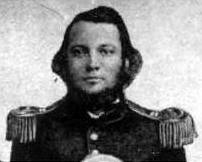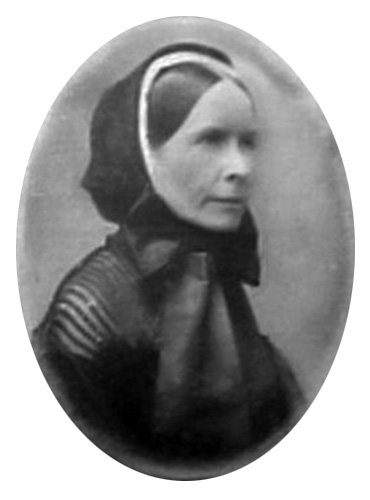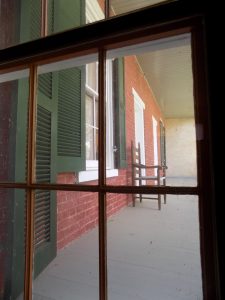From The Doorstep: Winchester Women Record Evacuation & Occupation, Part 2
 This is the final post for “From the Doorstep: Winchester Women.” Part 1 is available here.
This is the final post for “From the Doorstep: Winchester Women.” Part 1 is available here.
Mary Greenhow Lee started a letter on March 11, intending to send it to a friend. Instead, she kept writing, writing, writing until November 1865. Her private journal differs from other Winchester women’s primary sources. Widowed in 1856, it seems like she had more time to write; with no children of her own and grown nieces living with her in her widowhood, she played the hostess frequently, visited friends regularly, and wrote rather extensively about the war in Winchester.
Through her own hospitality, family connections, and her niece’s beaux, she often had an insider perspective on military happenings. Her first journal entry – which started as a letter – is not exception. Through Mary Greenhow Lee, we can note little details about leaders and military happenings. For example:
-

Colonel William S. Baylor is mentioned several times in Lee’s first entries. Some of Colonel Baylor’s whereabouts on March 11 and the lack of knowledge regimental commanders had about Jackson’s plans. (He commanded the 5th Virginia Regiment, Stonewall Brigade.)
- Which roads the units used to leave Winchester.
- The military and civilian uncertainty about battle or retreat and the rumors they believed.
- General Jackson’s supper location and orders to his officers to assemble.
- Turner Ashby lost another horse in a skirmish outside of town.
- Ashby’s cavalry left Winchester about 8 a.m. on March 12, 1862.
- About 9 a.m. Union troops entered town.
As with all primary sources, Lee’s words must be double-checked against other sources. There are times that her information doesn’t always add up with other accounts, but many times her accounts are verifiable and startlingly accurate. Though pro-Southern in her perspective, she did record details about Union armies and commanders, not always flattering but still providing valuable hints about these men and what they did in Winchester.

Mary Lee’s life changed with the Civil War. She still had her friends, her home (for a while), and her household concerns, but she watched the war. She judged rumors. She formed opinions. Whether she knew it or not, she observed happenings and wrote history, interpreting from her own view and belief system. On March 11, 1862, she picked up paper and started writing. Historians of Civil War military and social studies should be grateful she did.
Winchester March 11th, ‘62
Tuesday Night 12 o’clock
I know not how a letter can be sent, or to whom to address it, as our Post Office is removed to Harrisonburgh, but I feel as if it would help to pass away these dreadful hours of suspense, to tell some sympathizing friend the fluctuations of hope, fear & despair, during the last twenty-four hours.
Col. Baylor & Dr. Minor came out for breakfast this morning, not having heard any of the news of the day—they went out, & the first person who came in was Marshall Jones, to say good-by, & to get a lunch for Bob [Burwell], who could not leave his company; he said the long roll had beat & that they were to leave at 12 o’clock; he supposed, of course it was Strasburgh—then Col. Baylor came & said he did not think it probably they would go to-day & it was evident he expected to fight. Next, Dr. R. Baldwin passed, & said there was a man at his house, eating breakfast, who said there were 4000 men near Winchester, to re-enforce Jackson; the news was not sufficiently authenticated, to make me believe it, still it added to the excitement of the hour.
From twelve, till after one, we were very busy, putting in a place of safety, silver, papers, sword, flags, military clothes, war letters &c. &c. I do not think the Yankees, with all their cunning, will ever find them. Johnnie Mason dined with us, & he & the gentlemen, were in the same state of suspense, we were in—anticipating a fight, but still not knowing whether it would occur this afternoon. They took leave of us, & we stood on the porch, watching for, we knew not what; all the gentlemen we saw were prepared for a battle—the cavalry dashed by our door cheering; Loring’s men marched down the Berryville road; then a full battery; then two very large guns; the rumour was that there were 6000 Yankees at Opecquon [Opejquon], on that road, & 10,000 at Mrs. Carter’s. I did not think the soldiers looked as much excited as on Friday evening, when they feared battle; they were graver, & I thought, more doubtful the result. Jackson’s brigade was two miles from town, on the Martinsburgh road.
At this stage of events, Lal [Laura Lee, her niece] & I determined to go up to Selma, to see that everything was safe; I did not feel like leaving home, but I knew the walk & occupation would be better for Lal, who was very nervous; as for me, I can stand anything; the only effort is, that I cannot eat or sleep. There never was a more exquisite evening & it appeared a mockery of God’s works, that they should be profaned by such scenes as were expected every moment. Now I know who I am writing to—this must go to one of the dear Masons, as I know that they would want to know of the last visit to Selma, it may be a long, long time. We went through the house, collected some few articles worth preserving, for their owners, & gave to Patty Wells some spoils, such as cracked crockery &c. &c. The cat was at the door & it was touching to witness her delight at being caressed.
After our visitation, we went on the hill back of the house, & I saw, for the first time, the view it commands. Not a sound was to be heard, it was almost impossible to believe that thousands of men were so near, ready to engage in a terrible conflict; we could see the artillery on the Berryville road. When the streets, which had looked deserted when we went out, again thronged with soldiers. Dr. Minor had sent to beg for lint & bandages & the girls had been at Mr. Bartons making them; the Hospitals are entirely dismantled & in preparation for their use.

After dark, we heard loud cheering, & on going out, were met by Johnnie Baldwin, in a state of intense excitement; he said we were disgraced, that Jackson was evacuating the town without a fight. It was a terrible moment, that although it had been discussed so often it was impossible to be prepared for, & I was skeptical enough to doubt it, & to believe it was only a repetition of the error of Friday evening. But the girls did not doubt it, & Nette & Lal were delighted as they were certain all danger of a battle was over. We sat round the tea table, trying to arrange what we were to do, & what emergencies were to be prepared for, when, to the astonishment of all, Col. Baylor came in to tea & we found that only a portion of the army had gone out of town, to their provision wagons to get their suppers. Genl. Jackson was taking his supper at Mr. Graham’s, & nothing more was known of his plans. He told the Col. to be at Head Quarters to-night, it was supposed for a consultation, with his officers; but whether they are to leave to-night, or have a battle to-morrow, no human being knows, save our General. I am in such an anxious state, that I am afraid to go to bed, lest I should be roused by the sound of cannons.
The Yankees advanced this evening to within one mile of our lines, & are now, encamped three miles from town. There has been a skirmish, in which Turner Ashby’s horse was short undr him. Jackson was in fine spirits, but I earnestly hope, that, unless he intends to hold Winchester, he will not fight; as it will do no good, in the end, & will only draw on us poor helpless ones the fury of a defeated army, or the additional insolence of a victorious one. The idea, that by this time tomorrow night; we may be in their hands, it is too terrible for my mind to grasp; I still cling to the conviction that it will not be permitted; I do not think I could feel so calm & self reliant—(no I hope it is on God, I rely) if such fate was really in store for me. I almost fancy, & hope it will me, except that I know the rest of the family would be more helpless without me.
Oh! it is terrible to be listening for the cannon—now in the dead hours of the night, when every one save myself are asleep. I am in my lovely little room, & every sound startles me; horsemen are dashing by continually; why do they ride as if the enemy are pursuing them.[?] May the God of battles have mercy on us. Johnnie is very well; I gave him Mrs. Mason’s case of spectacles, which he will send by the first opportunity. Good-might dear Jeannie; I wonder if you will ever receive this rambling account of events & feelings, which are so momentous, that I feel words but faintly describe them.
Wednesday morning – All is over & we are prisoners in own homes. Ashby’s cavalry left town about 8 o’clock this morning & they were the last of our brave little army, that defied the enemy to the very last. For about an hour, a death like stillness pervaded the town, & then music & some cheering announced their approach; the Yankees came in on different streets, more quietly than I had anticipated… [i]
 Civil War women created important primary sources. However, the traditional interpretation has shifted their letters and journals to social and cultural history shelves. Certainly, many of their diaries belong in that category, but some should be considered by military historians. Whether they wrote about hero generals or terrifying invaders, victorious battles or “all is over” situations, the women who lived in epicenters of conflict had things to say about the military. Sometimes, they wrote military history, just from a very non-traditional perspective.
Civil War women created important primary sources. However, the traditional interpretation has shifted their letters and journals to social and cultural history shelves. Certainly, many of their diaries belong in that category, but some should be considered by military historians. Whether they wrote about hero generals or terrifying invaders, victorious battles or “all is over” situations, the women who lived in epicenters of conflict had things to say about the military. Sometimes, they wrote military history, just from a very non-traditional perspective.
I suggest it is helpful to look at the traditional military records and civilian accounts to obtain a fuller picture. Students of social history must understand the military happenings encountered by civilians, and military historians may find important research puzzle pieces within the records of women and children who saw the same war as the soldiers, but drew different conclusions or had time to write the specific details of what they witnessed.
Instead of separating journals and studies so rigidly and forcing accounts into strict categories, perhaps it is time to pursue the facts across the bookshelves and take a look at lesser-known sources. Of course, Civil War women did not write exclusively about the soldiers and military, but when they did—it is certain to be interesting and maybe even a missing link of important information.
Winchester’s women provide an example of such tiny and important details in their journal entries when Jackson left town and Banks arrived the following day. When a research wall rises and the colonels fail to explain, dig deeper and see if a woman might have heard a story, witnessed the moment…and wrote about it. She may give the longest version of the story, but she might have recorded the vital piece of information.
Source:
[i] Lee, M.G. edited by Eloise C. Strader (2011). The Civil War Journal of Mary Greenhow Lee. Winchester, VA: Winchester-Frederick County Historical Society. Pages 1-4.
Another great article. Thanks for sharing.
Thank you for this article on Winchester’s Women and their view points of the Civil War. We must read and share their stories, diaries, letters and journals, in order to tell, the true and full story of the war. They add timely observations and history to the record, via letters, diaries, etc. Women are generally the preservers of family histories and are left to be the guardians of the home front. We owe a great debt to Mary Green Howe Lee, Julia Chase, Cornelia Peake McDonald, and many, many more Winchester Ladies, who kept a written record of the Civil War, as it raged up and down the Shenandoah Valley. One great book I’d recommend to readers of this blog is “Defend the Valley” by Margaret Barton Colt. Thank you again, for including the Winchester Ladies!